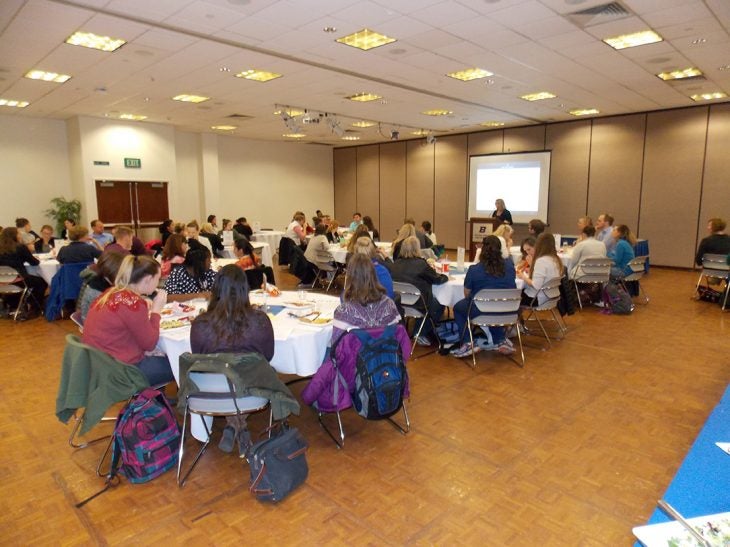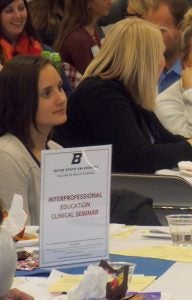
Eighty students from Boise State’s College of Health Sciences, Idaho State University, and University of Washington medical students gathered in the Boise State University Student Union Building on Nov. 1 for Boise State’s College of Health Sciences first biannual Interprofessional Education Clinical Seminar.
The purpose of the Interprofessional Education Clinical Seminar is to provide learners with evidence-based knowledge and skills on a selected health care topic through an interprofessional lens. The seminar’s structure featured an opening lecture and discussion from a clinical expert and culminated with an interprofessional team learning activity for the participants.
Interprofessional education is when learners from two or more health professions jointly create and foster a collaborative learning environment. The goal is to develop knowledge, skills, and attitudes that result in interprofessional team behaviors and competence, which are becoming more and more ingrained in modern American healthcare environments.
Jennifer Obenshain, clinical assistant professor for the Boise State School of Social Work and a licensed clinical social worker, presented and engaged the students on motivational interviewing as an interprofessional skill. Motivational interviewing is a strategic approach to working with patients that is designed to elicit and strengthen a patient’s own motivation and commitment to change. Motivational interviewing helps patients explore and resolve ambivalence that may prevent them from making changes they would like or need to make in their lives.

Motivational interviewing is collaborative, evocative, and honors patient autonomy. Motivational interviewing activates patients’ own motivation and resources for change and connects health behavior change with what the patient cares about. A part of human nature is the tendency to dislike coercion and being told what to do. Therefore, motivational interviewing acknowledges each person’s right and freedom not to change, which can make change more possible in the long run.
Using the guiding principles of motivational interviewing, healthcare providers can create cooperative and collaborative partnerships with their patients to make joint decisions about the patients’ care. The guiding principles are resisting the reflex to “make things right,” understanding and explore the patient’s own motivation, listening with empathy, and empowering the patient.
“I truly believe it was a very successful seminar and it exceeded my expectations,” said Phil Ford, Boise State College of Health Sciences Interprofessional education coordinator and clinical associate professor in the athletic training program. “The most exciting part for me was to see the level of student engagement both during and after the event. One student commented, ‘can we have another event like this next week.’ I hope that students continue to discuss motivational interviewing. I also hope they learned not only from Jennifer Obenshain but from each other. You never know, the clinical seminar may have dramatically influenced a future healthcare provider in a way that will positively impact patient/client care in the future.”
“It was really fun to see students from different disciplines interacting, working together and practicing the new skills as they were learning them,” said Obenshain. “At the end of the workshop, I asked the students how well we met the goal of interprofessional education (to learn from, with and about other professions). When every hand was raised and everyone was nodding and talking, I knew the event was a great success.”
The next Interprofessional Education Clinical Seminar will take place on March 5 and the topic will be emergency planning and preparedness. Students will receive an invitation from their college or school.